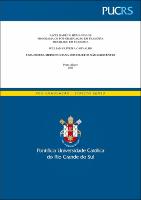| Share record |


|
Please use this identifier to cite or link to this item:
https://tede2.pucrs.br/tede2/handle/tede/9789| Document type: | Dissertação |
| Title: | Uma defesa meinonguiana dos objetos não-existentes |
| Author: | Carvalho, William Oliveira  |
| Advisor: | Pich, Roberto Hofmeister |
| Abstract (native): | O meinonguianismo de uma forma geral defende que: Dada qualquer condições de propriedades Φ, há necessariamente um objeto que possui exatamente todas as propriedades que satisfazem Φ. Nesse sentido, o domínio meinonguiano de discurso apresenta diferentes tipos de objetos como: completos, incompletos e impossíveis. Mas segundo Russell, tais objetos violam os princípios lógicos do terceiro excluído e o da não-contradição. E conforme Quine, não podemos nos comprometer ontologicamente com objetos que não existem. Assim, Russell e Quine vão se utilizar do método da paráfrase com a finalidade de eliminar as expressões de uma sentença que denotam objetos não-existentes como pertencente de alguma forma ao domínio do ser. Mas, a ideia básica desse trabalho é apresentar uma defesa meinonguiana dos objetos não-existentes; respondendo ao Russell de que o meinonguianismo não viola nem o princípio do terceiro excluído nem o princípio da não-contradição, e ao Quine de que o meinonguianismo não se compromete ontologicamente com nenhum objeto não-existente. Por fim, defenderei um domínio meinonguiano, onde os objetos sejam compreendidos como objetos lógicos de um discurso. O objetivo é estabelecer as condições de referência para todas as expressões denotativas de uma dada linguagem qualquer. |
| Abstract (english): | Meinonguianism in general defends that: Given any conditions of properties Φ, there is necessarily an object that has exactly all the properties that satisfy Φ. In this sense, the Meinongguian domain of discourse presents different types of objects such as: complete, incomplete and impossible. But according to Russell, such objects violate the logical principles of the excluded third party and that of non-contradiction. And according to Quine, we cannot commit ourselves ontologically to objects that do not exist. Thus, Russell and Quine will use the paraphrase method in order to eliminate the expressions of a sentence that denote non-existent objects as belonging in some way to the domain of being. But, the basic idea of this work is to present a Meinongguian defense of non-existent objects; responding to Russell that Meinguangianism does not violate either the principle of the excluded third party or the principle of non-contradiction, and to Quine that Meinguangianism does not commit itself ontologically to any non-existent object. Finally, I will defend a Meinongguian domain, where objects are understood as logical objects of a discourse. The objective is to establish the reference conditions for all the denoting expressions of any given language. |
| Keywords: | Meinonguianismo Compromisso ontológico Objetos Não-Existentes |
| CNPQ Knowledge Areas: | CIENCIAS HUMANAS::FILOSOFIA |
| Language: | por |
| Country: | Brasil |
| Publisher: | Pontifícia Universidade Católica do Rio Grande do Sul |
| Institution Acronym: | PUCRS |
| Department: | Escola de Humanidades |
| Program: | Programa de Pós-Graduação em Filosofia |
| Access type: | Acesso Aberto |
| Fulltext access restriction: | Trabalho não apresenta restrição para publicação |
| URI: | http://tede2.pucrs.br/tede2/handle/tede/9789 |
| Issue Date: | 4-Mar-2021 |
| Appears in Collections: | Programa de Pós-Graduação em Filosofia |
Files in This Item:
| File | Description | Size | Format | |
|---|---|---|---|---|
| WILLIAM_OLIVEIRA_CARVALHO_Dis .pdf | WILLIAM_OLIVEIRA_CARVALHO_DIS | 1.16 MB | Adobe PDF |  Download/Open Preview |
Items in DSpace are protected by copyright, with all rights reserved, unless otherwise indicated.




